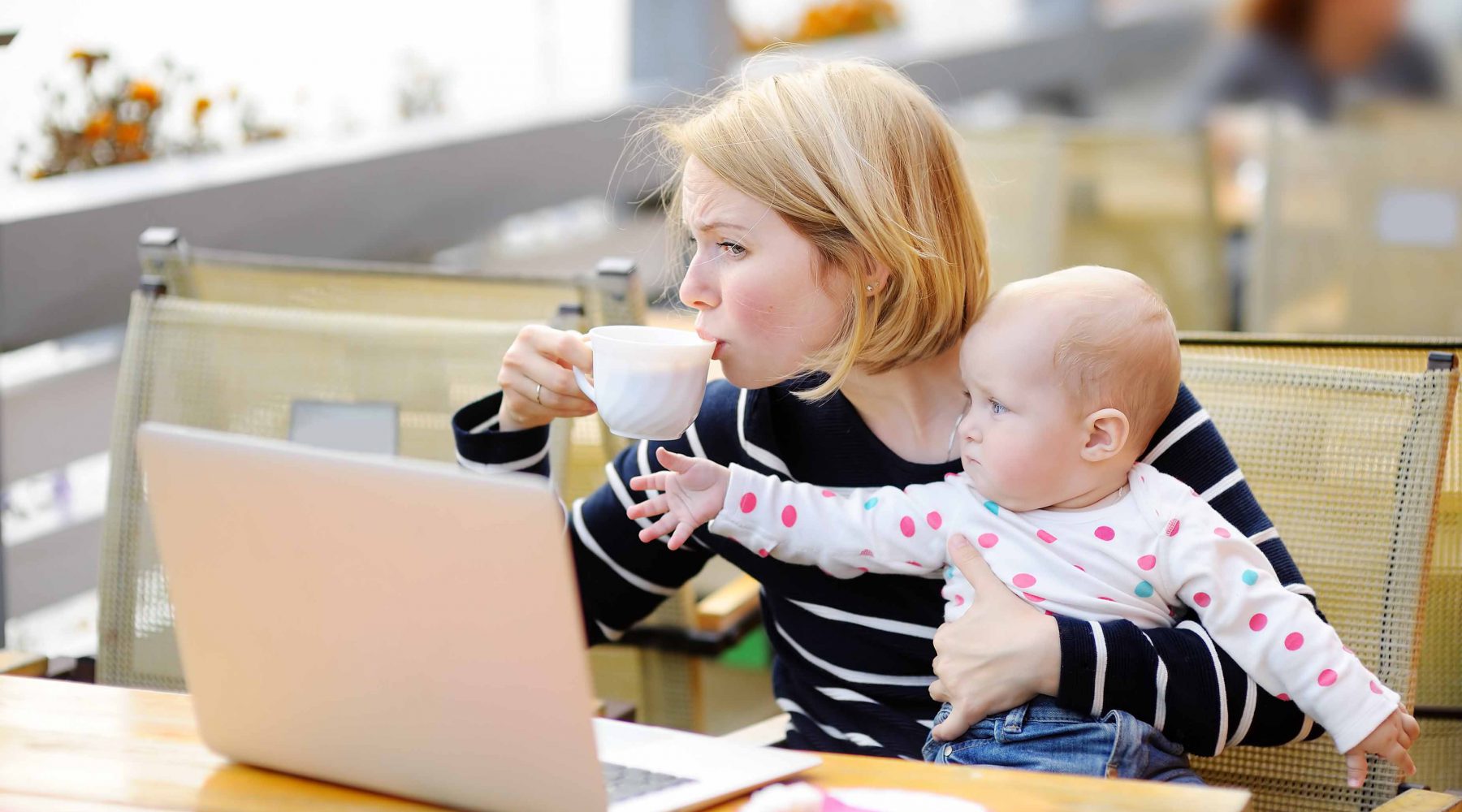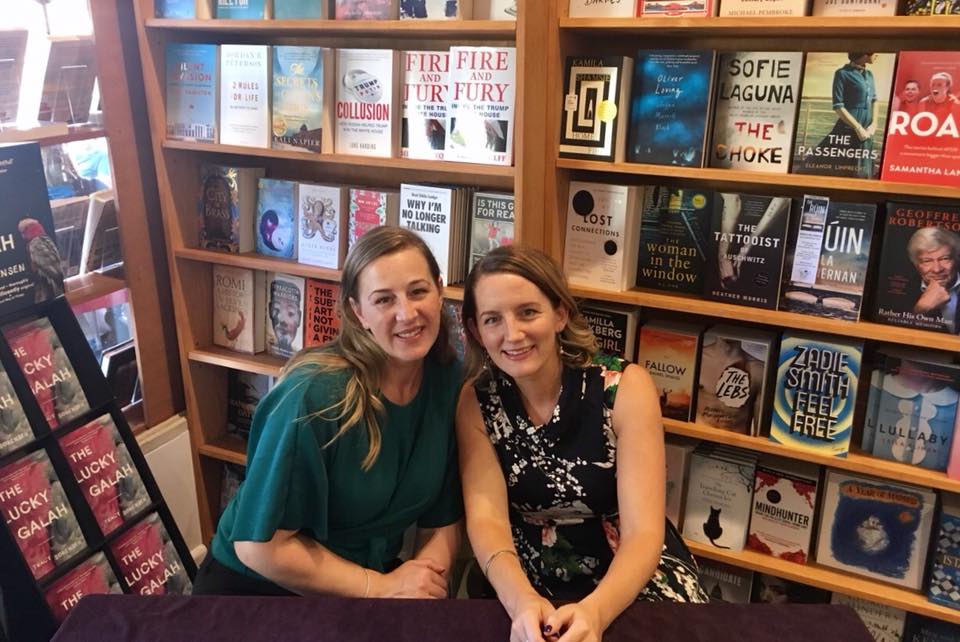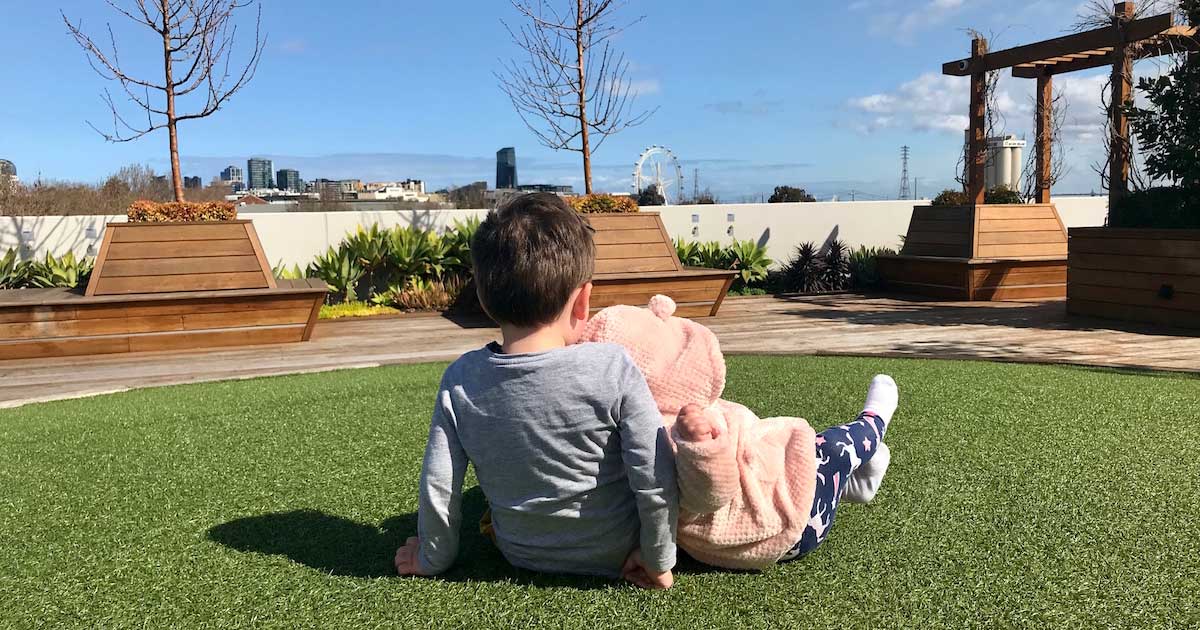
A new book brings together 27 powerful stories by working mums on the daily challenges of combining children, work and life. We speak with the authors and two of the mums, Danielle Ross Walls and Louise Correcha.
Louise Correcha and Danielle Ross Walls have just published Working Mums: Stories by real women on how they manage children, work and life. They bring together 27 stories by mums facing the daily challenge of combining work, life and families.
The stories are by mums in the public spotlight, such as singer Missy Higgins and Olympic champion Alisa Camplin, and other mums you may not have heard of, including the authors themselves.
We speak with Louise and Danielle:
Can you talk about your serendipitous meeting at the cafe with your babies? There was obviously a real connection…
Louise and Danielle: Yes, there was. We were sitting with our babies at neighbouring tables up the back of a large café we both often went to. We can’t remember who first said hello, but we do remember looking over to each other and starting a conversation, then finding out that we shared similar interests, including a wish to one day write books. We swapped contact details.
As our friendship grew, so too did our ideas for a book. It became evident that we had complementary skills and could make a good working team. We both also knew so many mums (and their partners) who were struggling with returning to paid work and raising their families, and thought that if we could share some of these stories, we could help others. Our book Working Mums was born.
Soon after, Danielle moved to Tasmania. We continued working on the book across states, but we did manage – over the two years we worked on it – to each make a couple of interstate trips to grab snippets of time to work together in person. Whenever we were in Melbourne, we always ended up at that same café. As Louise wrote about our meeting in a personal Facebook post:
‘Don’t brush off synchronicity. Say hi to that person your instinct is telling you to. And on life goals, as Tim Minchin recently said, “Put your head down and work with pride on whatever is in front of you… Just be aware the next worthy pursuit will probably appear in your periphery… if you focus too much on long-term goals, you might not see the shiny thing out the corner of your eye”. This book was most definitely the shiny thing out the corner of my sleep-deprived eye.’
A happy chance though that meeting most certainly was, it also helped, we think, that we are both people who – perhaps quite serendipitously– notice and welcome synchronicity.

One of the themes to emerge is the great challenges that working mums are facing. As a society, do you think we are failing to appreciate the kind of personal struggles that are being played out daily?
Louise:
Although it is not the intention of the book to analyse those personal struggles that are being played out daily, the stories do shed light on many of them. A friend recently reflected, for example, on how she was comforted by the stories not trying to offer ‘solutions’ but rather reassuring her that her daily struggles – as well as her accompanying internal monologue – were normal.
But yes, I do often find myself reflecting on how our society seems to fail to appreciate the struggles that occur daily, and the strain that such struggles can place on things like parents’ and children’s mental health and relationships.
This is for a variety of complex reasons, but one is perhaps that public discourse, understandably, tends to focus on bigger picture ideas.
So, while the topic of the very high cost of quality early childhood education and care in Australia – compared to many other developed nations – is often discussed (and rightly so), no-one really talks publicly about the myriad of little moments of negotiation and organisation (and often, sheer luck) that need to go into a parent being able to even get that little person ready and dropped off to care and then themselves to work, on time, every day.
And those moments when the normal events of a child’s health and development throw a spanner in the works of a carefully orchestrated day and the struggle that you face trying to meet all your responsibilities in any given moment.
Helping a young child with the important task of learning to tie their own shoelaces with the patience and encouragement you know you should be displaying, while simultaneously worrying about beating the traffic and getting to work on time, might be one common example of this daily juxtaposition of responsibilities.
As one woman reflected at one of our recent book launches, this book is making heard the stories we generally just share in places like our mothers’ groups – and that’s part of the reason we thought this book was important. To amplify those everyday stories and realities.
I’ve had so many interesting conversations with parents about these daily challenges – a mum I spoke to recently talked about receiving a call from school that her child was sick and needed to be picked up while she was in the car on the way to her first day of work at a new job. She had to pull over and frantically call everyone she knew to try and arrange someone to pick up her son, and still managed to arrive at her new job on time.
Similarly, on a talkback session on ABC Radio Brisbane recently, we spoke with a mother who told the story of a miscommunication with her ex-partner regarding picking up her 8-year-old son, which led to the boy being unintentionally left home alone. She found this out when her scared son called her in the middle of her chairing a meeting at work.
She stepped out of the meeting for a moment and called her new partner, who was able to leave work to go pick up the child. To comfort her son, she then took the phone back into the meeting room, placed it on speaker-phone and continued chairing the meeting (without telling anyone) so that her son – scared at home alone – could at least be comforted by her voice.
Finally, she was able to hear her partner arrive, whispered ‘I love you’ to her son, hung up and continued on with work. That story to me demonstrated so much about the strength of parents and how much we often don’t know about the mountains that are sometimes being moved by parents just doing their best to meet their different responsibilities every single day.
There are also the financial struggles. Some of our contributors go into these in the book, too. On top of the financial struggle, it’s sometimes difficult for many of us to find support with that. It may be difficult, for example, for many of our parents’ generation to empathise.
It doesn’t help that the media focus is often on superficial things like whether or not we eat out for breakfast more often than previous generations, or which suburb we want to live in, rather than the actual reality of housing costs for us compared how it might have been for our parents.
I often wonder how quickly things might change if the majority of children’s primary carers were men. And I’m not putting down dads.
There are many amazing fathers doing this important work every day – but the bulk of caring responsibilities do generally still fall on women’s shoulders. There’s a complex set of reasons for that, of course, including some employers making it very difficult for fathers who want to make their caring responsibilities visible. That needs to change.
It’s clearly a period of immense social change, and it always takes time for the systems in a society to catch up to such periods. But we need to keep having these important conversations so that things can change, and so that we can support each other with arguably the most important job for the future of humanity (well, perhaps literally rather than arguably– after all, if we didn’t procreate, none of us would be here discussing this).
What was the thinking behind mixing the stories of the well-known and not-so-well-known mums? How hard was it to get people to agree?
Louise:
The approach to collecting our stories evolved as time went on. We wanted to include some public figures whose stories we had seen and been inspired by – and which we thought would inspire others – but we also wanted to share the stories that often don’t get the opportunity to be heard. We’d seen many books about motherhood, but most were put together by or featured only the stories of public figures. As valuable as these books are, we wanted to be different and inspire mums that everyday mums like us could also put together a book that included our stories too.
We tried to cover many situations mothers might face when it came to seeking work outside of the home. We also tried to showcase a diversity of careers, but ultimately it was about what we felt was a complementary and compelling mix of stories.
The end result was a total of 27 inspiring contributors from all over Australia. Each had faced significant challenges and found new versions of themselves as a result of those challenges. Both Danielle and I include our stories, some contributors are dear friends of ours, some were guest speakers at Danielle’s Career Ideas for Mums expo, and others we sought out after hearing about them in the media. We heard Missy Higgins, for example, talking on ABC Radio about her son and how motherhood inspired her to increase her environmental activism and work raising awareness of other important issues.
We were also inspired by the important philanthropic and entrepreneurial work being done by mums like Alisa Camplin and George McEncroe (founder of Shebah), whose empowering stories we also include.
It wasn’t always easy, of course, but we approached it like any other professional job. We researched and prepared what would be required to approach publishers, including things like writing a synopsis, answering questions about our planned manuscript, considering timelines, and organising initial sample chapters to be written.
When we’d secured a publisher, we then continued approaching potential contributors. Again, like with any other job, we leveraged our respective skills and networks. There were quite a few people along the way, including public figures, that we approached and never heard back from. Mostly, however, we had a positive response to our idea, even if it was sometimes coupled with a polite no – often due to conflicting schedules.
Once we had secured our amazing and brave contributors, it was a huge process to get the book to publication – talk about project management. We had to coordinate 25 other busy mothers across Australia who were also, like us, juggling paid work and children and each available at different times, and then put it all together into a cohesive, complete manuscript. We communicated with each other constantly about our ideas, held regular meetings and decided on the delegation of various tasks.
We love the result, and we’re happy to see that from the feedback we’ve received so far that readers do too. We’ve heard some really lovely feedback about the personal impact the book has had on individual mums, which makes us so proud and happy.
The honesty of the women involved is a real strength. Were you surprised by how candid your contributors were, and were there any particular stories that moved you?
Danielle:
Yes! The bravery that these women have demonstrated by revealing their challenges – and in some cases, the devasting situations that they have faced during motherhood – was quite surprising for us.
We were also, however, extremely grateful. Many of these women had experienced transformation in some way as a result of their difficulties. This was one of the key elements of the book. Some of the stories deal with issues such as being a single parent, post-natal depression, loss of identity and workplace discrimination.
There are some very serious situations, such as the loss of a child or a contributor’s battle facing a near-death medical situation.
The book isn’t all doom and gloom though. It is certainly interspersed with laugh-out-loud moments that many of us can relate to as parents. Louise and I firmly believed in the value of sharing to help others feel less alone. There is often such strength in vulnerability.
Although we love every story in the book, we were particularly moved by the raw honesty of Olivia’s story.
Olivia Slater is a Badimia Yamatji and Whadjuk Nyoongar mother, student and wife. She dropped out of high school and left home as a teenager. Then later on, after having her first child, she was committed under ‘lock and key’ in a hospital, diagnosed with severe post-natal depression. Now, Olivia is a mature-age student who has taken up a scholarship to a prestigious university in the UK. She is now the first Indigenous Australian woman to undertake a PhD at the University of Cambridge.
We were fortunate that she was back here on holidays recently and could attend our official Melbourne book launch at the Sun Bookshop and Theatre in Yarraville. When it was her turn to speak, she pretty much held the floor. The room was silent and there were some tears as well. She is an incredible testament to bravery and perseverance.
The tips at the end of each chapter are a wonderful idea. How important is it for women to share those strategies?
Danielle:
We felt that as well as having a book of inspiring and empowering stories, it would be good to incorporate some easy, ‘bite-size’, practical elements for our readers. As I mentioned previously, the value of sharing is certainly a theme throughout, and for this reason we open the book with this quote by the Chilean-American Author Isabelle Allende: ‘Sisters: Talk to each other, be connected and informed, form women’s circles, share your stories, work together and take risks. Together we are invincible.’
When we asked each of our contributors for a simple tip to help other working parents, we tried to ensure that these covered a spectrum of areas such as mental health, parenting, sharing your passions and lifestyle with your children, education, housework, self-care and more.
I think that Louise and I would agree that one of our favourite tips would be from Olympic gold medallist and businesswoman Alisa Camplin, who says:
‘I am really careful about the language I use with the kids. If my daughter is up high on a climbing frame, I won’t say “Be careful!”, which invites doubt or fear. I’ll say, “Strong hands and strong feet!”, which shows confidence and helps develop positive, action-orientated self-talk.’
I use this tip a lot with my 5-year old, who is currently navigating swinging upside down with no hands on the monkey bars at kinder. My heart is often in my throat with his daring antics.
Working Mums is published by Finch, rrp $27.99.
Like this post? Please share using the buttons on this page.
Subscribe to The Parents Website


